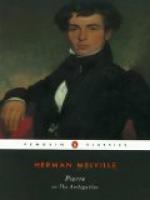|
This section contains 15,315 words (approx. 52 pages at 300 words per page) |

|
SOURCE: “Romancing the Stone: Melville's Critique of Ideology in Pierre,” in Theorizing American Literature: Hegel, the Sign, and History, edited by Bainard Cowan and Joseph G. Kronick, Louisiana State University Press, 1991, pp. 195-232.
In the following essay, Rowe discusses Pierre as Melville's critique of nineteenth-century literary production, suggesting that the novel is his farewell to writing as he conceived it before Pierre, and that it serves as a bridge to The Confidence-Man.
The founders of Rome …—Romulus and Remus—are, according to the tradition, themselves freebooters—represented as from their earliest days thrust out from the Family, and as having grown up in a state of isolation from family affection. …
The immoral active severity of the Romans in this private side of character necessarily finds its counterpart in the passive severity of their political union. For the severity which the Roman experienced from the State he was compensated...
|
This section contains 15,315 words (approx. 52 pages at 300 words per page) |

|


